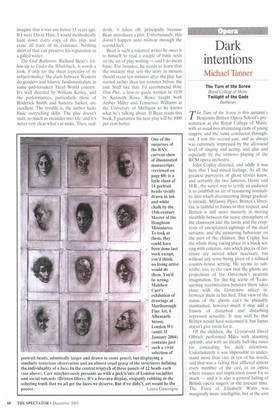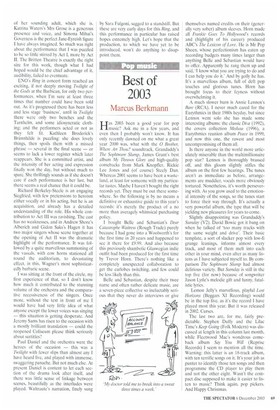Dark intentions
Michael Tanner
The Turn of the Screw Royal College of Music Twilight of the Gods Barbican
7r he Turn of the Screw is this autumn's Benjamin Britten Opera School's presentation at the Royal College of Music, with as usual two alternating casts of young singers, and the same conductor throughout. I saw the second cast, and as always was extremely impressed by the all-round level of singing and acting, and also and especially by the virtuoso playing of the RCM opera orchestra.
John Copley directed, and oddly it was here that I had mixed feelings. As all the greatest purveyors of ghost stories knew, and certainly the two Jameses, Henry and MR., the surest way to terrify an audience is to establish an air of reassuring normality, into which disconcerting things gradually intrude. Myfanwy Piper, Britten's librettist, is faithful to James in that respect, and Britten is still more masterly in moving stealthily between the suave atmosphere of the classroom and the lawns and the eruptions of unexplained sightings of the dead servants, and the unnerving behaviour on the part of the children. But Copley has the whole thing taking place in a black setting with columns, into which pieces of furniture are moved when necessary, but without any sense being given of a relaxed country-house setting. He seems to subscribe, too, to the view that the ghosts are projections of the Governess's neurotic imagination, for the big scene of Yeatsquoting recrimination between them takes place with the Governess asleep inbetween them in her bed. That view of the status of the ghosts can't be plausibly maintained, however much it may add a frisson of disturbed and disturbing repressed sexuality. It may well be that Britten would have welcomed it, but James doesn't give room for it.
Of the children, the 12-year-old David Olbrich performed Miles with alarming aplomb, and with an ideally bell-like voice for concealing his dark intentions. Unfortunately it was impossible to understand more than one in ten of his words, and that was a failing that afflicted almost every member of the cast, in an opera where nuance and implication count for so much — and it is also a general failing of British opera singers at the present time. The Flora of Elizabeth Watts was marginally more intelligible, but at the cost of her sounding adult, which she is. Katrina Waters's Mrs Grose is a generous presence and voice, and Simona Mihai's Governess is the perfect Jane-Eyreish figure I have always imagined. So much was right about the performance that I was puzzled to be so little stirred by Act I, more by Act II. The Britten Theatre is exactly the right size for this work, though what I had hoped would be the chief advantage of it, audibility, failed to eventuate.
ENO's Ring in concert form reached an exciting, if not deeply moving Twilight of the Gods at the Barbican, for only two performances. when I'm sure at least three times that number could have been sold out. As it's progressed there has been less and less stage 'business', until in Twilight there were only two benches and the Tarnhelm, and some idiosyncratic clothing: and the performers acted or not as they felt fit. Kathleen Broderick's Briinnhilde is puzzling: she does lovely things, then spoils them with a missed phrase — several in the final scene — or seems to lack a lower register which later reappears. She is a committed artist, and the intensity of her acting and expression finally won the day, but without much to spare. She thrillingly sounds as if she doesn't care if each performance is her last, but there seems a real chance that it could be.
Richard Berkeley-Steele is an engaging Siegfried, with few pretensions to heroism either vocally or in his acting, but he is an acquisition, and already has a detailed understanding of the role. His whole contribution to Act III was ravishing. The cast has no weaknesses, and in Andrew Shore's Alberich and Gidon Saks's Hagen it has two major singers whose scene together at the opening of Act II was the dramatic highlight of the performance. It was followed by a quite marvellous summoning of the vassals, with cow horns stationed all round the auditorium, to devastating effect, in this, Wagner's most sophisticatedly barbaric scene.
I was sitting at the front of the circle, my first experience of that, so I don't know how much it contributed to the stunning volume of the orchestra and the comparative recessiveness of the singers. Once more, without the text in front of me I would have had very little idea of what anyone except the lower voices was singing — this situation is getting desperate. And Jeremy Sams has risen to the occasion with a mostly brilliant translation — could the reopened Coliseum please think seriously about surtitles?
Paul Daniel and the orchestra were the heroes of the occasion — this was a Twilight with fewer slips than almost any I have heard live, and played with immense, swaggering panache. But not much else. At present Daniel is content to let each section of the drama look after itself, and there was little sense of linkage between scenes, beautifully as the interludes were played. Waltraute's narration, finely sung by Sara Fulgoni, sagged to a standstill. But these are very early days for this Ring, and this performance in particular has raised hopes extremely high. Let's hope that the production, to which we have yet to be introduced, won't do anything to disappoint them.



























































































 Previous page
Previous page